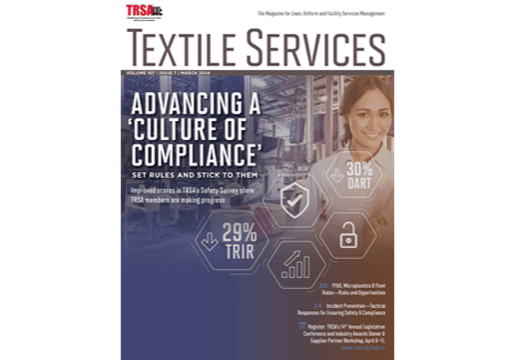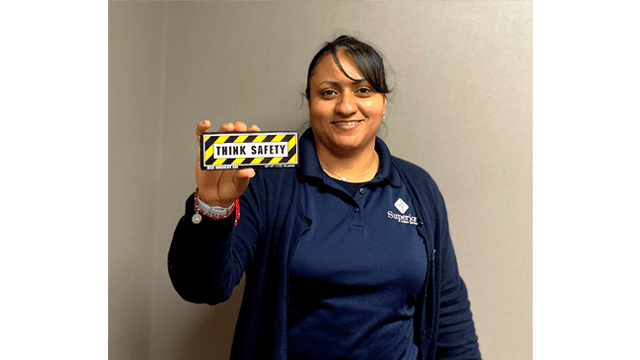Many of today’s leading linen, uniform and facility services operators have learned that embracing a culture of safety and regulatory compliance can fuel their business success in 2024 and beyond. That’s the upshot of this month’s cover article in Textile Services magazine, which was mailed the week of March 4.
“There’s plenty of research out there showing that safe operations tend to be more timely and of higher quality and more efficient,” said Michael Halter, director of loss control for insurance carrier, Haylor, Freyer & Coon, Syracuse, NY. Halter is one of several industry experts quoted in this article titled “Advancing a ‘Culture Of Compliance’—Set Rules and Stick to Them” (pg. 16).
Other industry leaders said that they see excellence in safety and regulatory compliance as giving them a competitive edge with customers and prospects. “Promoting a solid compliance record builds trust, credibility and confidence in your company’s commitment to transparency and accountability,” said Andrew Thornbury, COO of Miller’s Textile Services, Wapakoneta, OH. “For Miller’s, this supports our mission of showing up on time, doing what we say and finishing what we start … while having fun doing it.”
Of course in order to tout one’s safety record, a company needs a strategy for ensuring compliance. Several sources in this article commented on their approaches to issues, including the need for top-down management support. “A commitment by owners/management to obey all federal, state and local rules and regulations is of the utmost importance to ensure compliance by employees at all levels of a company,” said Russell Holt, chief compliance officer for Superior Linen Service Inc., Tulsa, OK. “When owners and top management prioritize following legal requirements, it sends a message that adherence to rules and regulations is non-negotiable.”
A related issue that companies grapple with is whether they should designate a full-time individual, like Holt, to oversee compliance issues or divvy up those duties among managers in several departments. Ed Arzouian, compliance and special projects manager for Bates Troy Healthcare, Binghamton, NY., cited the ongoing shifts in regulatory mandates as reason enough to assign a specific person to manage this effort. “It is necessary to have a management person or persons whose primary duty is to ensure regulatory compliance,” said Arzouian, a 16-year veteran of Bates Troy. “Regulatory compliance is always a moving target. Documentation, recording, reviewing and oversight must be ongoing. That is difficult to do if it’s not part of one’s job purview.”
Other companies, such as Miller’s Textile Services, take a slightly different approach. “For independent companies, having a dedicated compliance manager might not be practical, due to our size and the complexity of regulations,” Thornbury said. “At Miller’s, we find that cultivating partnerships with external subject-matter experts in the legal and financial fields, collaborating with industry groups and maintaining a board of advisers gives us peace of mind. Additionally, having management staff attend and share knowledge from both industry and nonindustry workshops and webinars fosters a culture of regulatory compliance and responsible business practices in the company.”
Another issue that the article addresses is when to bring in outsiders, such as attorneys or consultants, to advise companies on compliance issues. Arzouian said outside counsel can help companies navigate complex compliance issues that change over time. Halter adds that outside experts can bring diverse perspectives to a range of issues, which is often helpful. “You see what you see every day, right? We all draw off different experiences. So you know, as an inspector or an auditor, I may see something based on my experiences.” Halter adds that if an outside counsel identifies non-compliance issues, companies must act to correct them. Otherwise they could face potential liability from the U.S. Occupation Safety and Health Administration (OSHA) or other agencies.
Several sources also noted the importance of documenting these and other compliance efforts, such as safety training, policies, procedures and other actions that OSHA or other agencies could ask about following an incident or during an inspection. “If it’s not documented, it didn’t happen.” Thornbury said.
Click here to see a PDF version of the full article.
Click here for subscription information on Textile Services.
Sign Up For Our Newsletter
Receive the latest updates on the linen, uniform and facility services industry from TRSA delivered straight to your inbox.







